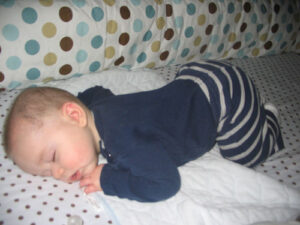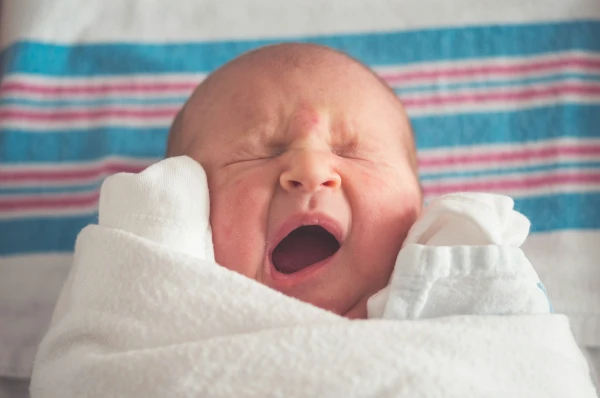As parents we aren’t given an instruction manual with our baby, but wouldn’t that be nice? Just imagine all of the second-guessing and baby sleep mistakes we could avoid! The doctor delivers your baby, the nurse hands you the instruction booklet, detailing out exactly how to raise her. Instead, we get the baby, some flowers, and are left to wade through advice and suggestions, basically, we are left to figure it out as we go along. Sleep is one of many puzzles that new parents need to resolve, and it’s a daunting task. Before baby, you were able to sleep a full 8 hours each night with limited interruptions, and sleeping in was a normal part of life.
With the arrival of a new baby, you are suddenly up in the middle of the night…multiple times. Baby needs to be fed, changed, and soothed back to sleep regardless of whether it’s 2 in the morning or the afternoon. The first few months can be daunting, and many parents feel immobilized by shame, guilt and sometimes blame and don’t know where to start to change their child’s sleep habits. This is compounded by parents natural tendency to compare their babies to others in regards to sleep. This comparison causes unrealistic expectations of your own baby, as all babies are different. Some babies begin to sleep through the night at four months old, while others don’t achieve this goal until nine months due to a need to feed at night. It’s less important to focus on how you made these baby sleep mistakes than how you are going to change it.
Please note that much of the advice in this article is best practiced with babies over four, and sometimes six months.
It’s a common belief that your child’s sleep habits will suddenly change on their own, or that you just have to endure sleep deprivation in the meantime, but that is simply not true. Believe it or not, sleep is not something that you are born knowing how to do. Falling asleep and staying asleep (and even putting yourself back to sleep) are all things that everyone has to learn. Sleep is one of those unavoidable life skills, and the sooner you begin to teach your baby how to fall asleep, the sooner you can start sleeping longer. Please remember, every baby is different. Your baby may not be ready until a little later, so don’t despair.
Parents don’t make their child’s need for sleep a priority.
Everyone needs good, restful sleep every night, both parents and their babies.
Parents are often inconsistent in how they put their child to sleep at bedtime and in their response to the child’s awakenings.
Babies thrive on structure and consistency, if there are times when you feed her back to sleep, but other times she is rocked or brought back to bed with you out of desperation, you are actually making it more difficult for baby to learn to fall asleep. Find a consistent pattern that works for you and your baby, or perhaps take a look at beginning some gentle sleep coaching to help establish a healthy routine once your baby is past infancy (usually between four and six months).
Parents inadvertently create MORE crying by giving up and resorting to their original sleep crutch after a certain amount of time.
When you begin sleep training, it is so very important that you are consistent, and do not fall into old habits. Sure, it can be a tough transition, but you are teaching your baby a valuable life skill, falling asleep on his own. And if you utilize my gentle sleep methods, the transition is gradual enough that your baby shouldn’t be crying for extended periods, as you are there to reassure them.
Not creating a flexible schedule or routine during the day and before sleep that comforts our children and helps them prepare for sleep.
Babies thrive on schedules and routine, and sleep is just like any other transition during your child’s day. If you prepare them for it, they will be less likely to resist it. Just like you prepare for dinner by washing your hands and setting the table, bedtime should have a lead-in routine.
Children are comforted by predictable, repeated routines. It helps them understand what is coming next. For example, ‘Mom always reads me a book before my nap. Naptime must be soon.’ You can begin a routine with your baby during infancy, and expand it to meet the needs of your baby as they grow.
Putting their child to bed too late.
This is a very common baby sleep mistake. Did you know that most babies actually display signs of sleep readiness between 6 and 8 pm? Yet, many parents actually wait until they are ready for bed at 10 or 11. This results in an overtired, fussy, unreasonable baby or child who will most assuredly have trouble drifting off to sleep, which can also increase night wakings.
Allowing their child to fall asleep being nursed, bottled fed, rocked or walked to sleep at bedtime.
While I am not against any of these items as part of your baby’s bedtime routine, it is incredibly important that you put your baby to bed ‘drowsy but awake’. This is the first step of your baby’s learning to fall asleep on her own.
Expecting quick results when trying to change a habit you have created with your child for months and often years.
You wouldn’t expect to be able to change your habits overnight, and with your child, it’s no different. Gentle changes take time, which is why I advocate a gradual transition to so that your child will gently learn to put themselves to sleep.
An important note: If you you have been sleep coaching your child for a week with no results, then please see your doctor to rule out any underlying medical condition that may be contributing to or causing your child’s sleep problems.
If you have any questions about your baby’s sleep, be sure to check out my Sleep Lady Facebook Page, where we have Gentle Sleep Coaches available to answer your questions every day.
Was this article helpful to you? For more baby, toddler, and family sleep tips and tricks, please subscribe to The Sleep Lady’s Facebook, Twitter, Pinterest, Google+, and YouTube channel! If you are looking for more sleep content, please check out Get Sleep Now-an exclusive members-only area designed to provide in-depth help and support during your sleep coaching experience.




